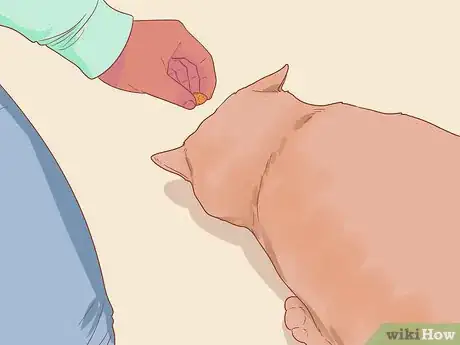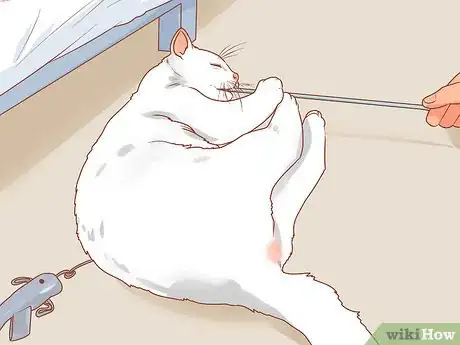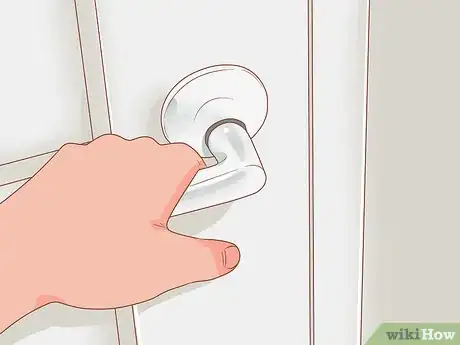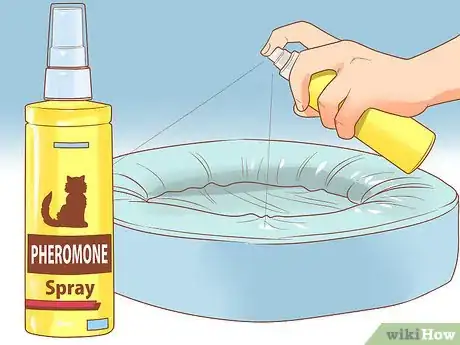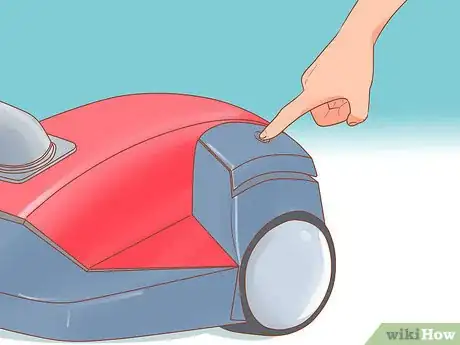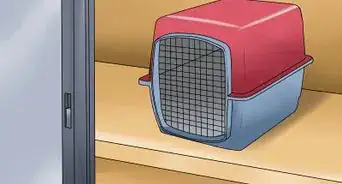This article was co-authored by Lauren Baker, DVM, PhD and by wikiHow staff writer, Megaera Lorenz, PhD. Dr. Lauren Baker is a Veterinarian and Assistant Scientist at the University of Wisconsin-Madison. With over 10 years in veterinary medicine, she specializes in the concept of “one health,” which uses insights from veterinary medicine to help human medical research. She holds a Ph.D. in Comparative Biomedical Sciences, a Doctor of Veterinary Medicine, an MS in Comparative Biomedical Sciences, and a Bachelor’s degree in Psychology from the University of Wisconsin-Madison.
There are 7 references cited in this article, which can be found at the bottom of the page.
This article has been viewed 138,874 times.
Cats love to hide, and the space underneath the bed is a prime spot. While hiding is a normal behavior for most cats, it can be frustrating or inconvenient for the humans they live with. The steps you should take to get a cat out from under a bed will depend on why the cat is hiding and how urgently you need the cat to come out. Depending on the circumstances, you could try luring the cat out, creating a comforting environment so the cat eventually comes out on its own, or – as a last resort – scaring your cat out.
Steps
Luring Your Cat Out
-
1Call your cat. If your cat is well-acclimated to you and your home, and is not feeling particularly scared or stressed, getting your cat to come out could be as simple as calling them. If you normally call your cat at dinner time, for treats, or just when you want to give them affection, then your cat probably already associates being called with good things. Call your cat as you normally would for food or companionship.[1]
-
2Offer your cat food or treats. It may be enough just to crinkle a treat bag or tap a spoon on the rim of a food can. If your cat is feeling extremely scared or shy, try setting out food, treats, or catnip near the bed and wait quietly nearby until the cat comes out to eat.
- If you have a new cat that is still getting acclimatized, this can be a good way to help them get more comfortable in your home. Allow your cat to eat undisturbed and go back under the bed if it desires. After repeating this process a few times, your cat will probably begin to feel safer and start to spend more time out in the open.
- You may have more luck with canned foods or particularly tantalizing treats like tuna, roasted chicken, or pieces of deli meats.
Advertisement -
3Lure your cat out with a toy. If your cat has a favorite toy, like a “fishing lure” on a string, try dangling it and shaking it around in the cat’s line of sight. Toys that make sounds (e.g. toys with bells) may be especially effective for attracting the cat’s attention. Dangle the toy near the edge of the bed. Once the cat starts playing with it, slowly back up to lure them out all the way.
Waiting It Out
-
1Be patient with your cat. Many cats hide because they are scared or stressed. If you are trying to acclimate a new cat to your home, letting them hide for a bit can help them feel more secure. If there’s no urgent reason to make them come out, don’t try to rush them.[2]
-
2Close the door. Your cat may feel overwhelmed if they are in a new space that is larger than what they are used to. Limiting your cat’s “territory” to a single room may help them feel safer and encourage them to come out of hiding and explore.[3]
-
3Keep things quiet. Minimize noise in the room, and keep children and other pets out until your cat is feeling less nervous and overwhelmed. Try playing some soothing classical music to give the cat a gentle sound to focus on and distract them from other, more alarming noises.[4]
-
4Use a calming pheromone spray. Purchase a bottle of Feliway or a similar product designed to reduce cat anxiety from your vet or pet supply store. Treat the room with the spray. Put a treated towel in a cardboard box, or spritz a little spray on a cat bed, and put it near your bed.[5]
-
5Reward your cat for coming out. Don’t try to soothe or pet the cat while they are hiding, or you may inadvertently reinforce the hiding behavior. Ignore the cat until they start to emerge, then offer praise, affection, or treats.[6]
Scaring Your Cat Out
-
1Turn on the vacuum cleaner. If you absolutely must get your cat out from under the bed in a hurry, the sound of a vacuum cleaner is highly effective. Bring the vacuum cleaner into the bedroom, set it up next to the bed, and turn it on. Most cats will bolt at the sound. If your cat is really determined to stay, try sliding the vacuum cleaner hose under the bed and shaking it around.[7]
-
2Sweep under the bed with a broom. Insert a broom under the bed and gently sweep it back and forth to try to chase the cat out. This may not be effective if your cat is able to climb up into your box-spring.
-
3Try moving your cat's bed. Some cats only enjoy being under the bed when they can also press themselves against the wall or corner. Try moving your bed away from the wall so that your cat will be less comfortable in that area.
Expert Q&A
Did you know you can get expert answers for this article?
Unlock expert answers by supporting wikiHow
-
QuestionAfter a vet visit (treatment for rash) and being given a bath, my cat has been under a wire rack for over three weeks. She only comes out to eat and use the litter box. What do I do?
 Lauren Baker, DVM, PhDDr. Lauren Baker is a Veterinarian and Assistant Scientist at the University of Wisconsin-Madison. With over 10 years in veterinary medicine, she specializes in the concept of “one health,” which uses insights from veterinary medicine to help human medical research. She holds a Ph.D. in Comparative Biomedical Sciences, a Doctor of Veterinary Medicine, an MS in Comparative Biomedical Sciences, and a Bachelor’s degree in Psychology from the University of Wisconsin-Madison.
Lauren Baker, DVM, PhDDr. Lauren Baker is a Veterinarian and Assistant Scientist at the University of Wisconsin-Madison. With over 10 years in veterinary medicine, she specializes in the concept of “one health,” which uses insights from veterinary medicine to help human medical research. She holds a Ph.D. in Comparative Biomedical Sciences, a Doctor of Veterinary Medicine, an MS in Comparative Biomedical Sciences, and a Bachelor’s degree in Psychology from the University of Wisconsin-Madison.
Veterinarian Your cat is likely stressed from the visit. Go slowly with them, following the advice in this article. Three weeks is a long time, so you should also call your vet, as my guess is this may be interfering with at-home treatment for the rash. Your vet may also be able to offer you more specific advice, as they know both you and your cat.
Your cat is likely stressed from the visit. Go slowly with them, following the advice in this article. Three weeks is a long time, so you should also call your vet, as my guess is this may be interfering with at-home treatment for the rash. Your vet may also be able to offer you more specific advice, as they know both you and your cat.
Warnings
- It is normal for cats to hide under beds and in other dark places from time to time, either because they are scared or simply because they enjoy relaxing in enclosed spaces. However, if your cat is displaying unusual hiding behavior (i.e. hiding more than usual, not coming out for meals, etc.), it may be a sign of stress or illness. If you are concerned about your cat’s behavior, take your cat to the vet.[8]⧼thumbs_response⧽
References
- ↑ http://www.adventurecats.org/backcountry-basics/teach-your-cat-to-come-when-called/
- ↑ http://www.adoptapet.com/blog/cat-hiding-behavior-and-what-you-should-know
- ↑ https://www.heavenlypets.org/socializing-a-shy-or-fearful-cat/
- ↑ http://www.adoptapet.com/blog/help-my-new-cat-is-hiding-and-wont-come-out/
- ↑ http://www.adoptapet.com/blog/help-my-new-cat-is-hiding-and-wont-come-out
- ↑ http://www.adoptapet.com/blog/cat-hiding-behavior-and-what-you-should-know
- ↑ https://virtuavet.wordpress.com/2010/09/06/how-to-catch-an-uncatchable-cat/
- ↑ http://www.petmd.com/cat/behavior/5-ways-help-hiding-cat
About This Article
To get your cat to come out from under the bed, try offering it a treat, like tuna or roasted chicken. Alternatively, try waving around a toy, such as a lure on a string. You could also go out of the room and close the door, since your cat may feel more secure about leaving its hiding place if it's in a smaller space. If you have to get your cat out quickly, turn on the vacuum cleaner and stick the hose under the bed to scare it out. For tips on how to get your cat out with a pheromone spray or a broom, keep reading!

